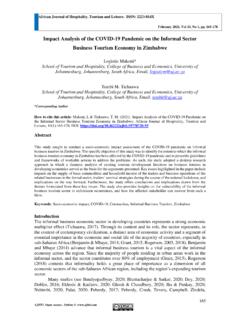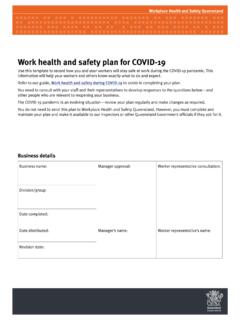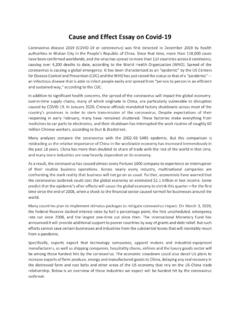Transcription of Covid-19 and the Irish Hospitality Sector: Impact and Options
1 Covid-19 and the Irish Hospitality Sector Impact and Options March 20th 2020. Hospitality sector is the first to feel the economic brunt of Covid-19 , it requires a recovery plan The Hospitality sector (bars, restaurants and hotels) has been hit hard in the past week with most businesses shuttered and staff laid off. Final data is not yet available but conservatively 100,000 people or over half the sector have already been laid off. To save this sector which provides critical support to the regional economy will require two bold actions by government: 1. Step in and keep employees in the sector in their jobs - a net cost to the exchequer of per week will cover 75% of the net take home pay of the employees in the sector 2. Provide loan based support interest free to provide working capital for the industry to restart itself Without these supports the industry will have long term structural damage resulting in economic loss, damage to the brand of Ireland Inc and damage to the social fabric.
2 This would also bring ireland in line with other EU countries in terms of direct support and income continuance. While this report focuses on the Hospitality sector, the approach and solutions could well be a template for other industry sectors facing similar challenges. 75% Of net take home to 180,000. employees in the sector 0% Interest free working capital facilities to re-start the sector March 2020. PwC 2. The state should act now to protect the employees and employers in the Hospitality sector Executive Summary The Hospitality sector is a key component of the Irish economy worth up to and employing 180,000 people. The last week has seen an unprecedented level of business closures (albeit we hope temporarily) and corresponding layoffs of an enormous scale. While the safety net of social welfare is welcome, in this paper we argue that the State should step in now and subvent employees to ensure that employment is protected. We also highlight that even with this step, there will be a critical need for working capital support to get the business back on its feet post the Covid-19 crisis.
3 We argue that a level of income continuance and working capital support would ensure that the industry, which not only provides a valuable direct economic benefit but also contributes to tourism and the overall brand of Ireland, survives. We define Income Continuance as a scheme where the state would subvent employers to pay staff under strictly limited conditions: 75% of home pay;. Benefit capped at the equivalent of an annual salary of 50,000 per annum and;. Strictly limited to one week after the end of social distancing Working capital has not been fully costed in this draft but we present a worked example based on a typical bar with a significant food trade. It shows that, unsupported, a proprietor would need to be able to sustain 62 weeks of negative cash before returning to the black. The knock on Impact of allowing this industry to be severely damaged to the economy and taxation is huge. There is also a significant additional Impact on our social fabric especially given the level of societal disruption being caused by the current crisis.
4 Hospitality is core to our DNA and goes to the heart of brand Ireland. We recognise that this is a significant action. We can understand that there are clear spill-over impacts into other industry sectors, while we would argue that this may well be appropriate; we have simply highlighted one sector. We would also posit that in the last economic crisis the state took a number of step by step actions before eventually having to step in and spend 64bn to resolve the crisis. An income continuance scheme would cost net per week for the Hospitality sector. We would argue that bold and early action will ultimately be more positive and impactful. March 2020. PwC 3. Irish Hospitality Sector Key Statistics 180,000 directly employed by the sector bn direct spend with suppliers by the industry Various reports value the sector at up to bn total contribution to the Irish economy bn contribution to Exchequer Source: CSO data, Bord Bia, Hospitality Skills Oversight Group, Failte Ireland, Revenue Commissioners March 2020.
5 PwC 4. Covid-19 has created an emergency situation within Irish Hospitality with the near closure of the entire industry Background Report Context Ireland's Hospitality sector is a critical component of the Irish economy. Various reports This report presents an Impact assessment of Covid-19 on value the sector's total economic contribution at between 5 - , representing the Irish Hospitality sector (focusing on Hotels, Restaurants between - of GDP. While the economic activity of the sector is underpinned by and Pubs) as well as mitigation Options to support its the performance of the tourism sector, Ireland's largest indigenous industry, the sector is recovery as Ireland emerges from the current crisis. inextricably linked to overall performance and well-being of both the national and global The report includes: economy. Access to disposable income and corporate and business activity are key pillars of sectoral performance. 1. A view of the Impact on the Hospitality sector, taking both a short term and a long term position.
6 Since the arrival of the first Covid-19 case into the Republic of Ireland, the Hospitality industry (Hotels, Restaurants and Pubs) have experienced a near shut down as consumers 2. An understanding of the current economic value that remain at home. Social distancing in general, the closure of bars and restrictions on indoor the industry contributes to the Irish economy. gatherings have meant the industry is effectively shuttered. 3. An overview of business costs and the Impact of a Hospitality has been the first sector to experience large numbers of job losses, with this Covid-19 related closure on a Hospitality business. Impact being experienced very quickly. Getting these people back into work as Ireland emerges from the Covid-19 crisis is critical. However, there is a significant risk that unless 4. Employee payment protection Options to provide interventions are taken, the businesses which employ these individuals may no longer be higher income levels during the crisis for those who viable and unable to return to a business as usual state.
7 This is an industry which often lose their jobs, whilst at the same time ensuring that operates on short cash flow reserves therefore limiting its ability to recover from a period of employees remain connected with their employers shock. during this period. Ireland along with other European countries are implementing a series of measures 5. a review of actions taken by other countries and a designed to protect workers and stimulate the economy in a period where demand has comparison against Ireland's actions to date. effectively been eliminated. This report seeks to identify Options to support the industry through the crisis and ensure its successful reboot when we emerge. The Options and suggested framework identified in this report can be applied to other sectors and industries March 2020. as well. PwC 5. This is an industry that is truly national;. positive Impact in every local community It is also brand defining for Ireland Inc Impact of Hospitality and Tourism Regionally Where did Tourists go in 2018.
8 (Source: Key Tourism Facts 2018 - Failte Ireland). Tourism & Consumer Spending Tourism related expenditure reached bn in 2019 with coming from overseas tourists. Failte Ireland reveal that card spending alone across the Hospitality sector totalled 7bn in 2018. Bord Bia report a spend on consumer food services within restaurants ( 3bn), hotels ( ) and pubs ( ) in 2019. Hospitality Spending The Hospitality sector supports jobs within the wider economy through its supplier related expenditure. In 2019 restaurants, hotels and pubs collectively spent on food purchases from a range of suppliers. Regional Employment While the sector employs some 180,000 workers, 71% of sectoral employment is outside of Dublin. The activities of the Hospitality sector are crucial engines within regional and local economies and have been instrumental in supporting the recovery of Ireland's more rural regions post financial crisis. Source: CSO Labour Force Survey, Bord Bia, Failte Ireland March 2020.
9 PwC 6. Whilst layoffs have been the biggest issue facing the sector today but there are severe challenges tomorrow Immediate Issues Post-Crisis Concerns Long-term Impact Majority of full time and all part time Concern surrounding how Risk of long term damage to the staff laid off immediately. finance/credit will be obtained when sector through shuttered properties, Anticipation is to try and re-employ all operating again. slow recovery and squeeze out of when operating again. Fear of cash shortages and quality players Focus on trying to retain key staff but availability of funding for how long is uncertain. Cashflow Accumulated negative cash balances Labour Brand Shortages from period of shut down. Limited cash reserves available to pay Corporate bookings for the remainder Intense price competition amongst a number of key suppliers/ staff. of the year are being cancelled. hotels in an attempt to increase Focus on maintaining future supply Reduction in corporate events being occupancy rates.
10 Chain by paying key suppliers. held for the foreseeable future. Negative Impact on profitability if Supply Trying to support the small local Corporate Corporate travel to Ireland is likely to widespread price competition occurs. Chain suppliers. Spend be curtailed. Profitability Overall, increased competition Ensure cash is available to cover Risk of newer businesses without A significant decrease in the number immediate overheads. cash reserves being unable to of International tourists visiting Insurance - potential to claim loss reopen. Ireland. cover v future premium increases. Loss of rural bars and restaurants Optimism that more Irish people may feared. choose local holidays providing an Fixed Permanent Food Ireland ecosystem at risk and opportunity to target this market but Overheads Closures unlikely to recover quickly Tourism lack of consumer confidence is a risk Source: Industry expert interviews, PwC Analysis March 2020. PwC 7. Hospitality payroll provides a weekly contribution to the Irish economy of Hospitality Sector Payroll Economic and Exchequer Contribution breakdown ( m).







